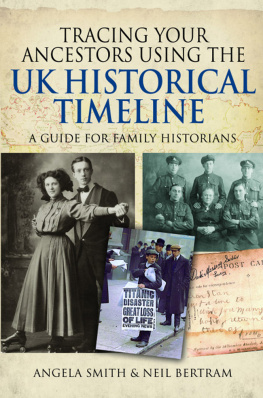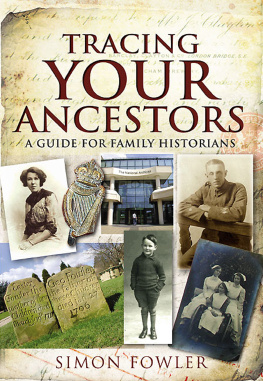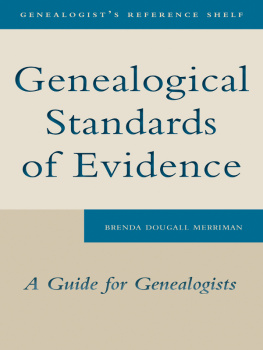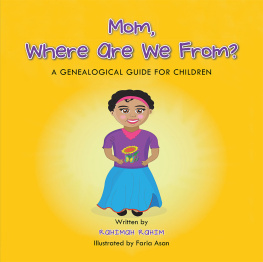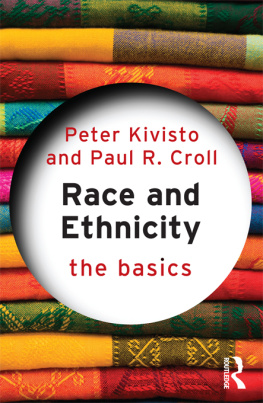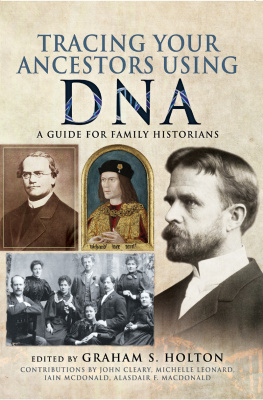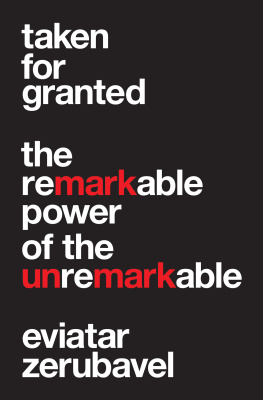ANCESTORS AND RELATIVES
ANCESTORS AND RELATIVES
Genealogy, Identity, and Community
Eviatar Zerubavel


Oxford University Press, Inc., publishes works that further
Oxford Universitys objective of excellence
in research, scholarship, and education.
Oxford New York
Auckland Cape Town Dar es Salaam Hong Kong Karachi
Kuala Lumpur Madrid Melbourne Mexico City Nairobi
New Delhi Shanghai Taipei Toronto
With offices in
Argentina Austria Brazil Chile Czech Republic France Greece
Guatemala Hungary Italy Japan Poland Portugal Singapore
South Korea Switzerland Thailand Turkey Ukraine Vietnam
Copyright 2012 by Eviatar Zerubavel
Published by Oxford University Press, Inc.
198 Madison Avenue, New York, New York 10016
www.oup.com
Oxford is a registered trademark of Oxford University Press
All rights reserved. No part of this publication may be reproduced,
stored in a retrieval system, or transmitted, in any form or by any means,
electronic, mechanical, photocopying, recording, or otherwise,
without the prior permission of Oxford University Press.
Library of Congress Cataloging-in-Publication Data
Zerubavel, Eviatar.
Ancestors and relatives : genealogy, identity, and community / Eviatar Zerubavel.
p. cm.
Includes bibliographical references and index.
ISBN 978-0-19-977395-4 (cloth : alk. paper) 1. GenealogySocial aspects.
2. GenealogyPsychological aspects. 3. GenealogyPolitical aspects.
4. Families. 5. Kinship. 6. Heredity. I. Title.
CS14.Z47 2011
929.1dc22 2011005663
1 3 5 7 9 8 6 4 2
Printed in the United States of America
on acid-free paper
To Yael, Noga, and Noam
the relatives I have actually chosen
Attai begot Nathan, and Nathan begot Zabad; and Zabad begot Ephlal, and Ephlal begot Obed; and Obed begot Jehu, and Jehu begot Azariah; and Azariah begot Helez, and Helez begot Eleasah; and Eleasah begot Sisamai, and Sisamai begot Shallum; and Shallum begot Jekamiah, and Jekamiah begot Elishama.
I Chronicles 2:36-41
All living creatures are cousins.
Richard Dawkins, The Ancestors Tale, 13
CONTENTS
PREFACE
My fascination with genealogy goes back more than fifty years to the time when, as a ten-year-old boy, I loved reconstructing ancient dynasties. Years later, as a sociologist, I became professionally interested in both time and cognition, the combination of which ultimately led me to write a book, Time Maps, about the way we organize the past in our mind. The part of that project that most intrigued me was the chapter Ancestry and Descent, and four years after completing that book, I indeed found myself gravitating back to that chapter, focusing this time on the way we organize our visions of relatedness. Finally, in June 2007, I started writing Ancestors and Relatives.
Several peoplefamily, friends, and colleagueswere kind enough to read early drafts of the manuscript and offer me valuable comments and suggestions. I am particularly grateful in this regard to Yael Zerubavel, Noam Zerubavel, Asia Friedman, Tom DeGloma, Dan Ryan, Catherine Lee, Kathy Gerson, Ruth Simpson, Debby Carr, James Cook, Neha Gondal, Sarah Richardson, Stephen Rutter, Hannah Kwon, John Martin, Ethel Brooks, Phaedra Daipha, and Chris Nippert-Eng. I have also benefited greatly from discussing my ideas with Noga Zerubavel, Arlie Hochschild, Paul DiMaggio, Mara Loveman, Nadia Abu El-Haj, Robin Wagner-Pacifici, Wayne Brekhus, Rachel Brekhus, Kristen Springer, Marlie Wasserman, Jenna Howard, Paul McLean, Viviana Zelizer, Ira Cohen, Allan Horwitz, Cynthia Epstein, Lynn Chancer, Shelley Germana, Katherine Verdery, Alondra Nelson, and Hana Wirth-Nesher. Finally, I wish to thank Ilanit Palmon for her kind help with the graphics.
In the spirit of the book, I dedicate it to my lifetime companion Yael and my children Noga and Noam, the relatives I have actually chosen.
Eviatar Zerubavel
East Brunswick, New Jersey
January 2011
ANCESTORS AND RELATIVES
[1]
THE GENEALOGICAL IMAGINATION
[R]elationships to ancestors and kin have been the key relationships in the social structure; they have been the pivots on which most interaction, most claims and obligations, most loyalties and sentiments, tur[n].
Robin Fox, Kinship and Marriage, 13
Why do we consider Barack Obama a black man with a white mother rather than a white man with a black father? What are the implications of knowing, as we now do, that chimpanzees are genetically closer to humans than they are to gorillas? Why did the Nazis believe that unions between Germans and Jews would produce Jews rather than Germans? Are sixth cousins still family?
By the same token, why is it considered more prestigious to be a tenth-generation than a second-generation American? Why have white segregationists always found sex between black men and white women more threatening than between white men and black women? Why do we tend to exaggerate our differences from the Neanderthals? Why do many people find the proverb Mules are always boasting that their ancestors were horses funny? Why do both ethnic majorities and minorities often oppose intermarriage?
In order to even address, let alone answer, such questions, we must first examine our unmistakably social visions of genealogical relatedness. What we need, in other words, is a sociological understanding of ancestry and descent.
As evident from the wide popularity of the television series Who Do You Think You Are?
Such deep obsession with ancestry (progonoplexia)
Our current fascination with genealogy has also been getting a tremendous boost from the growing popularity of genetic ancestry testing. Not only does genetics enhance our awareness of hereditary disease risk
As manifested in identity labels such as an Italian American or a Kennedy, despite the modern meritocratic rise of the self-made individual, who we are still depends at least partly on whom we descend from. Thus, throughout the Muslim world, for example, descendants of the Prophet still bear the honorific title sayyid or sharif. and words like pureblood, mixed-blood, full-blood, and half-breed are still commonly used as nounlike identifying labels.
Furthermore, our ancestral background affects not only how others see us but even how we experience ourselves. Indeed, knowing who our ancestors were is fundamental to our sense of who we are. Consider, for example, the way PBS describes its four-part television mini-series African American Lives 2:
Henry Louis Gates, Jr. returns as series host to guide notable African Americans on a search for their ancestry. Genealogical investigations and DNA analysis help Maya Angelou, Don Cheadle, Morgan Freeman, Peter Gomes, Linda Johnson Rice, Tom Joyner, Jackie Joyner-Kersee, Chris Rock and Tina Turner discover where they come from and who they are.
By the same token, given the long history of human migrations, we often feel nostalgic about the long-lost time when place, identity, culture and ancestry coincided. Standing on the land that ancestors knew can thus
produc[e] a sense of genealogical connection that is sometimes explained as an inexpressible sense of spiritual affinity, and often experienced bodily in shivers down the spine and goose-bumps. [It] is often imagined as a shared physical experience that links ancestors to their descendants across time.
Next page

